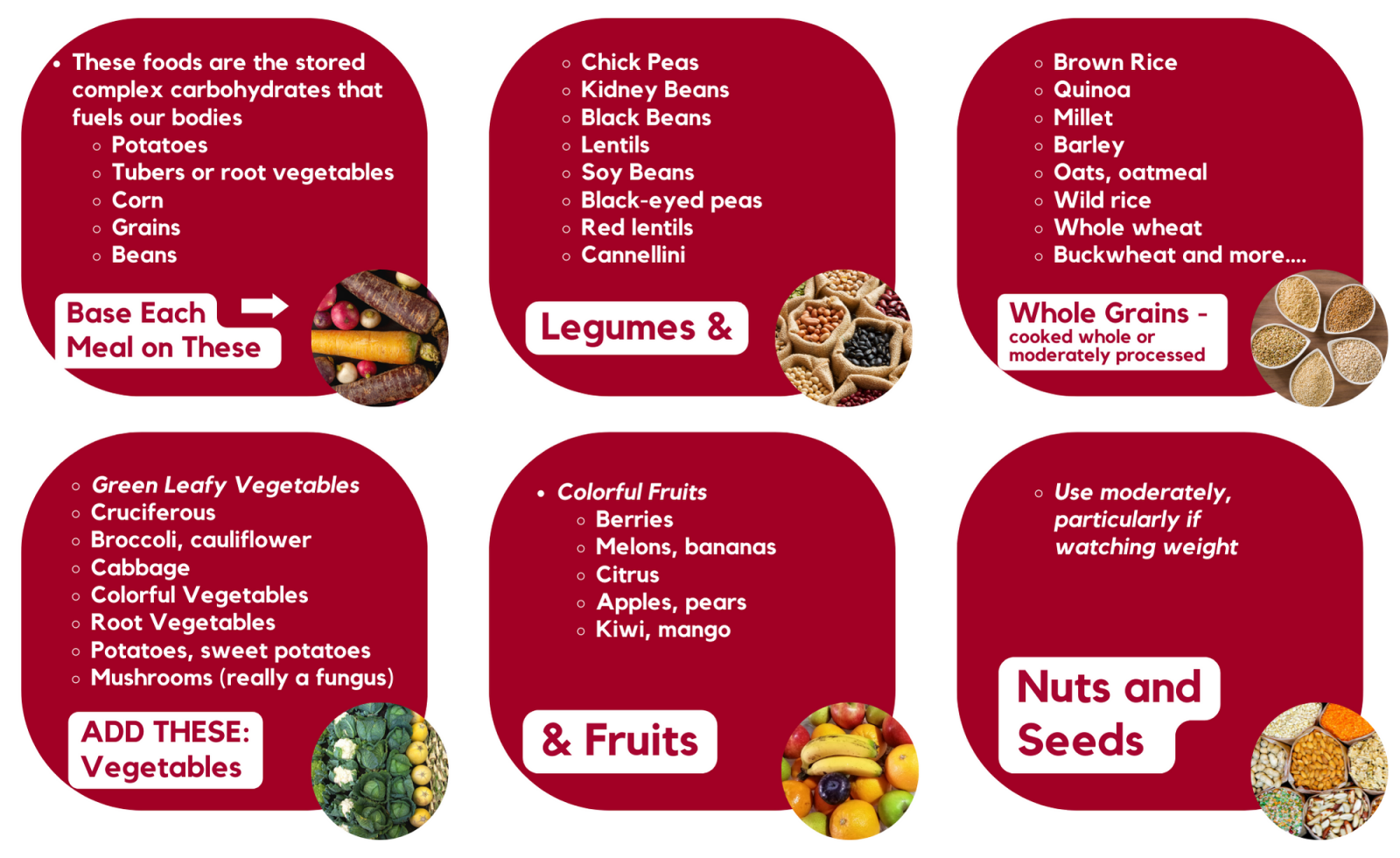Eat a Variety of Whole Plant Foods at Each Meal and in Between!
- Center your diet on whole grains, legumes, vegetables and fruits
- Avoid animal-based foods – meat, poultry, dairy and eggs
- Eat as much as you want

Keys to Eating Healthy
- Reduce or eliminate added fat and oils
- Avoid refined and processed, embrace whole foods
- Read ingredient lists carefully
- Eat an excellent breakfast every day
- Whole grains and fruit for example, but veggies and legumes are also good
- Proper hydration is crucial – drink water
Avoid Animal- Based Foods
Excess protein increases carcinogenic activity and is correlated with risk for all chronic diseases. The RDA for protein is 10% of calories, though most tend to eat twice that, which is hard on the liver and leaves the body in an acidic state. The only way to over-consume protein is through excess animal food consumption., or the use of isolated protein in processed foods.1 2 Animal foods have NO FIBER. Whole plant foods are filled with fiber, to fill you up, keep you regular, and regulate nutrients into the body.
Avoid Dairy
Contrary to popular belief, dairy consumption is correlated with higher bone fracture rates among adults. This might be due to it's acidic properties, demanding calcium to be leached from bone to neutralize blood. Cow's milk and products are also associated with autoimmune diseases, diabetes and cancers of the prostate and breast, as its proteins promote growth hormones increasing tumor growth.³ ⁴
Avoid Oil and Added Fats
Oils are the most calorie-dense food there is, with ~ 120 calories per tablespoon. Olive oil is 14% saturated fat, leaving arteries at risk. Even adding just a little oil can have an impact on health. Studies show that oils constrict blood flow after a meal by 10%.⁵
Refined, Processed Foods
There is a correlation between refined foods and disease - sweets, pastries and pastas - bereft of their original fiber, vitamins and minerals. Such simple carbs convert to sugars in the blood without control, leaving you more at risk for insulin resistance, colon cancer, vascular disease and weight gain. ⁶ ⁷
Breakfast
The body needs fuel after fasting all night! A healthy meal high in fiber and complex carbohydrates will allow for steady levels of blood sugar through the day, prolonged feeling of fullness, optimal alertness and less desire for snacking. Oatmeal with fruit, whole-grain cereals, or smoothies made with frozen fruit, plant milk and fresh vegetables, are great ways to start the day. ⁸⁻¹⁰
Read Ingredients
Read what's in the package, box or can of food that you are consuming. Note that ingredients are listed in descending order, with the most in the listed first. Purchase products with a few, recognizable ingredients that are all whole plant food. Avoid additives, and added sweeteners, oils and fats. ¹¹
Hydration
Water carries nutrients, oxygen and electrolytes throughout the body for all of its vital work, including nerve signaling, muscular movement and toxin removal. Signs of not drinking enough include fatigue, fluid retention and constipation.12 Drink plain water throughout the day.
Find an ENT & Allergy Associates Doctor Near You, or Explore More Blog Topics
